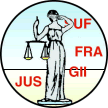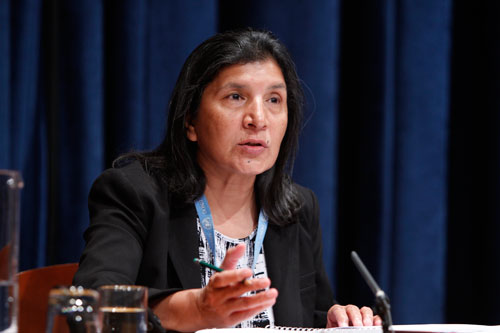Talking Points

The introduction on each document is provided as a guide but you will need to download the PDF to see the full text.
IWA’s Weblog
Thoughts of International Women Activists in the IAW: IWA’s Weblog
Talking Points
July 2012: Women’s Human Rights: The Arms Trade Treaty and CEDAW
Panel discussion organized by UN Women, IANSA, WILPF and IAW
Paper presented by Ms Pramila Patten, CEDAW Expert, Chairperson of Working Group on General Recommendation on the “Protection of the Human Rights of Women in Conflict and Post-Conflict situations”.
Rosy Weiss, IAW Honorary President, Chief Representative to the UN in Vienna and Convenor of the IAW Commission on Peace, recommends warmly this interesting paper by Ms Pramila Patten.
On the internet you can find Ms Pramilla Patten's picture and also hear her voice, when talking on: www.unmultimedia.org/radio/english/2011/07/focusing-on-women-in-conflict-and-post-conflict-situations/
Introduction by Ms Pramilla Patten
I am extremely grateful to UN Women and the co-sponsors IANSA, IAW and WILPF for hosting this side event at the time of the negotiations of this first and historic Arms Trade Treaty (ATT) which purports to establish common international standards for the import, export and transfer of conventional arms. This treaty provides a unique opportunity for Member States to agree on tough controls on the arms trade that would significantly help reduce armed violence against women across the world…… an opportunity that is priceless.
I feel particularly privileged to be speaking at this event and to be associated with the most prominent NGOs who have been engaged in the ATT process for many years. IANSA led civil society organizations worldwide in supporting the idea of an ATT and in 2003, in launching the www.controlarms.org Control Arms Campaign.
July 2012: Analysis of the outcome of Rio+20 2012
Ms. Natalia Kostus, who has headed the IAW delegation to Rio+20, has written an analysis of the outcome of Rio+20. We can warmly recommend reading her article. It has 8 interesting pages of inside information and every page is worth reading.
Natalia, compliments and thank you for your valuable work!
Introduction
While the leadership of the United Nations and governments are calling the Rio+20 United Nations Conference on Sustainable Development a success and a historic achievement, to the people of the world, civil society and women, Rio+20 was a missed opportunity and a failure.
This mismatch in assessment could not be more visible both at Rio and now in the weeks that follow. In truth, Rio+20 outcome “The Future We Want“ is historic and successful in that it launched the process to establish the post 2015 development framework focused on sustainable development.
The criticism of the Rio+20 outcome is that it fails to meet the pressing environmental and social challenges that the world faces today and it fails to deliver immediate much needed action reflecting the real sense of urgency, scale, and ambition necessary for successful implementation and financing on sustainable development.
 Download of Analysis of the outcome of
Rio+20 2012
Download of Analysis of the outcome of
Rio+20 2012
 June
2012: Special Rapporteur on violence against women
June
2012: Special Rapporteur on violence against women
Ms. Rashida Manjoo (South Africa) was appointed as UN Special Rapporteur on violence against women, its causes and consequences for an initial period of three years by the United Nations Human Rights Council in June 2009 and commenced her functions in August 2009.
UNITEDNATIONS HUMAN RIGHTS: Open-ended Working Group on Ageing
The statement in this attachment draws out various aspects about women living in poverty and some of the reasons why the huge majority of the world’s poor are women. Women in all countries of the world are touched by poverty and many of our member organisations and individual members work to eradicate this situation.
Please use this Talking Point to inform more people and lead to further positive action.
International Women’s News editor Priscilla Todd writes: "The number of people living with HIV is a staggering 33.3 million, 15.9 million of whom are women and 2.5 million children (under 15 years) in 2009. Total deaths in 2009 1.8 million.
The HIV virus touches many of us in some way or another yet there is still so much ignorance and prejudice about HIV/AIDS that the Alliance believes information given in its Talking Point can be used by different people in different ways to help tackle this global problem. Women are so often the innocent victims of this virus and can unknowingly pass it on to their children, thus perpetuating the suffering in another generation.
October 2010: Millennium Development Goals
In this Talking Point the emphasis lies on the Millennium Development Goals. We share with you two issues: the UN goes local and the statement of the Youth Coalition on Sexual and Reproductive Rights.
Editor’s comment: As you can see one important goal is missing from the quotation of David Morrison, UNCDF Executive Secretary, in his opening remarks below – Goal 5, Empowerment of Women.
Maybe he forgot to include it. Or maybe the journalist forgot to mention it. Regardless, men generally don’t like the expression ‘empowerment’ in connection with women. They often think of a battle about power between men and women.
Well, investing in women is a great thing. Investing in empowering women also means investing in children, health and education. So, please give your attention to the statement of the Youth Coalition on Sexual and Reproductive Rights.
September 2008: The Fight against Aids
The content consists of a shortened version of several articles, mailed to us by IAW members. It covers areas such as the Bush administration and HIV/AIDS, the Commission on AIDS in Asia, female condoms for Indian sex workers, and the Deputy Secretary-General Asha-Rose Migiro’s call for practical ideas in the fight against HIV/AIDS in Africa
October 2007: Environment and Sustainable Development
Environmental and Sustainable Development needs our utmost attention, particularly because of the lack of gender aspects in all the conferences up to now for Bali.
We also urge all IAW members to look for women, who can and will send a strong message that gender equality has to be integrated in the negotiations and debates of the Bali Conference. They need our continuing support.

